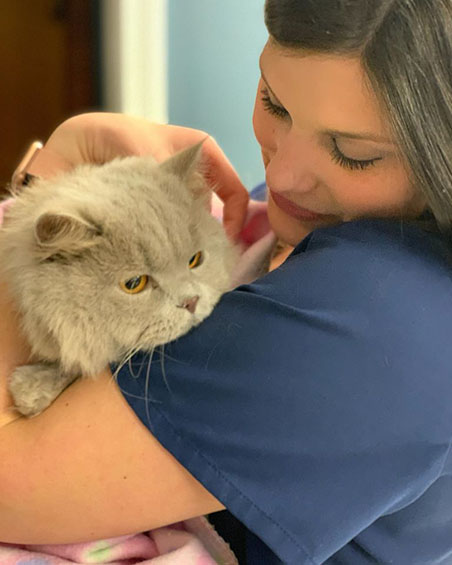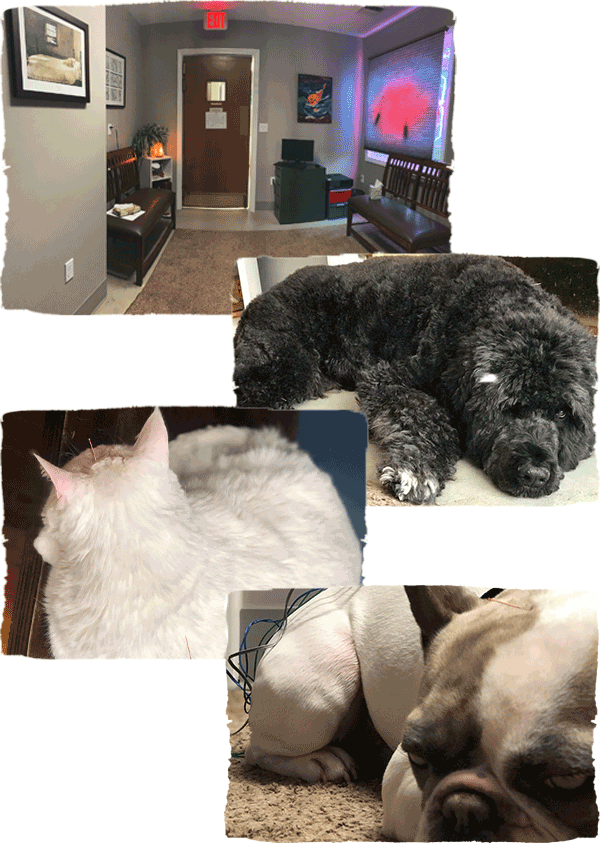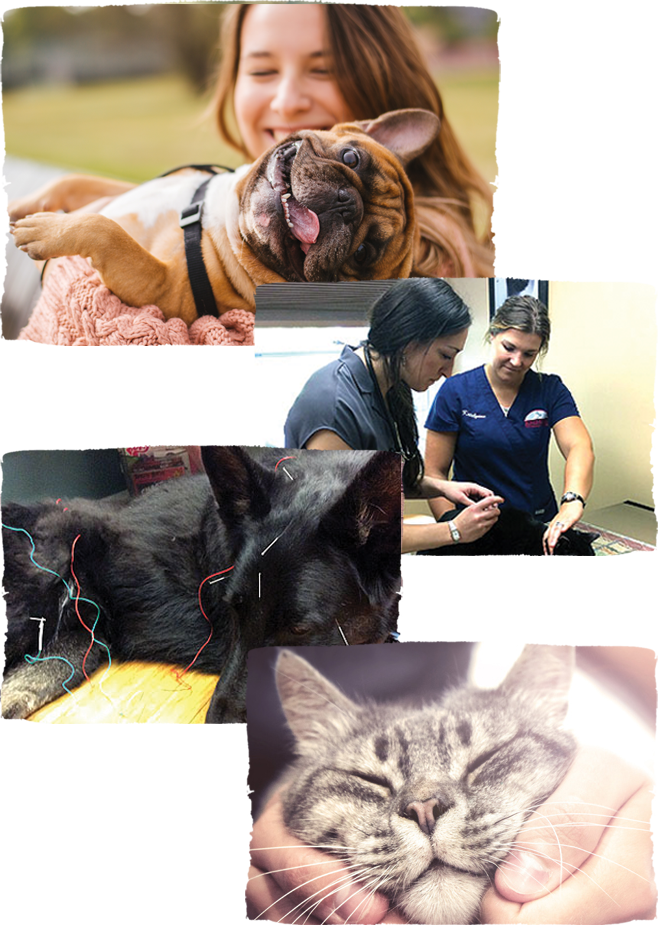Benefits of Laser Therapy
Laser Therapy is beneficial for treating inflammatory processes in the body and is often utilized for many various injuries or conditions including, but not limited to, post-surgical procedures on incision sites, ear infections and even osteoarthritis.
Laser Therapy can be used to treat many conditions including:
Acute Conditions:
- Ear infections
- Infections
- Cuts/ Bites
- Inflammations
- Tooth Extraction
- Pain Relief Sprains
- Strains & Fractures
- Post-Surgical Healing
Pain Relief Chronic Conditions:
- Degenerative Joint Disease
- Periodontal Disease
- Lick Granulomas
- Hip Dysplasia
- Feline Acne Tendonitis
- Arthritis
Benefits of Laser Therapy
Laser Therapy is beneficial for treating inflammatory processes in the body and is often utilized for many various injuries or conditions including, but not limited to, post-surgical procedures on incision sites, ear infections and even osteoarthritis.
Laser Therapy can be used to treat many conditions including:
Acute Conditions:
- Ear infections
- Infections
- Cuts/ Bites
- Inflammations
- Tooth Extraction
- Pain Relief Sprains
- Strains & Fractures
- Post-Surgical Healing
Pain Relief Chronic Conditions:
- Degenerative Joint Disease
- Periodontal Disease
- Lick Granulomas
- Hip Dysplasia
- Feline Acne Tendonitis
- Arthritis
Massage Therapy
Massage Therapy is “the use of fingers, hands, and machines to manipulate the soft tissues, or stimulate at the cellular or neurological level of the body to improve healing and recovery” – IVC Journal.
Massage is a form of holistic care as it restores balance and increases the individual’s overall wellness. Massage therapy is a great way to relieve pain, reduce muscle tension, reduce swelling, improve joint flexibility, promote tissue healing and increase circulation. It is still important to get a veterinarian’s consent before trying massage therapy. This is because massage therapy is contraindicated in patients with fevers, internal organ problems, undiagnosed masses, bacterial or fungal diseases and fracture disease.


Massage Therapy
Massage Therapy is “the use of fingers, hands, and machines to manipulate the soft tissues, or stimulate at the cellular or neurological level of the body to improve healing and recovery” – IVC Journal.
Massage is a form of holistic care as it restores balance and increases the individual’s overall wellness. Massage therapy is a great way to relieve pain, reduce muscle tension, reduce swelling, improve joint flexibility, promote tissue healing and increase circulation. It is still important to get a veterinarian’s consent before trying massage therapy. This is because massage therapy is contraindicated in patients with fevers, internal organ problems, undiagnosed masses, bacterial or fungal diseases and fracture disease.
Benefits of Massage Therapy
Massage therapy can be used to help treat numerous conditions. These conditions include but are not limited to:
Acupuncture
“Holistic medicine is the art and science of healing that addresses the whole person – body, mind, and spirit. The practice of holistic medicine integrates conventional and alternative therapies to prevent and treat disease, and most importantly, to promote optimal health. This condition of holistic health is defined as the unlimited and unimpeded free flow of life force energy through body, mind, and spirit.”
~American Holistic Health Association
The term “holistic medicine” has evolved so much in our common dialect that few people understand its actual meaning. Although holistic medicine embraces both traditional and alternative therapies, it is often misused to describe only nonconventional medicine. In an effort to continue providing the best care and medicine to our patients, the Burlington Veterinary Center has introduced new therapies to complement our strong foundation of conventional western medicine. Despite common perception, traditional western medicine and alternative therapies have been known to work synergistically rather than conflict with each other. It is our goal to take advantage of this relationship in a way that will provide the greatest benefit to our patients.
Acupuncture
“Holistic medicine is the art and science of healing that addresses the whole person – body, mind, and spirit. The practice of holistic medicine integrates conventional and alternative therapies to prevent and treat disease, and most importantly, to promote optimal health. This condition of holistic health is defined as the unlimited and unimpeded free flow of life force energy through body, mind, and spirit.”
~American Holistic Health Association
The term “holistic medicine” has evolved so much in our common dialect that few people understand its actual meaning. Although holistic medicine embraces both traditional and alternative therapies, it is often misused to describe only nonconventional medicine. In an effort to continue providing the best care and medicine to our patients, the Burlington Veterinary Center has introduced new therapies to complement our strong foundation of conventional western medicine. Despite common perception, traditional western medicine and alternative therapies have been known to work synergistically rather than conflict with each other. It is our goal to take advantage of this relationship in a way that will provide the greatest benefit to our patients.
Acupuncture Benefits
Acupuncture is different from traditional western medicine. Profound therapeutic effects can be achieved without the adverse effects often associated with conventional medicine. Acupuncture is particularly valuable when medications are poorly tolerated or contraindicated in a patient.
Acupuncture can also compliment the effects of western medicine, especially in the treatment of chronic conditions. The addition of acupuncture to an established treatment regimen can improve clinical outcome. Acupuncture can potentiate the positive effects of western medicine in conditions like inflammatory bowel disease and osteoarthritis. It can also be used to palliate the adverse effects of western medications, such as antibiotic-induced diarrhea or side effects from chemotherapy.
Acupuncture is also a great option for patients with more than one condition. A single acupuncture session can be used to treat musculoskeletal pain in multiple areas, as well as concurrent systemic diseases.
Here are just some of the diseases acupuncture can help:


Acupuncture Benefits
Acupuncture is different from traditional western medicine. Profound therapeutic effects can be achieved without the adverse effects often associated with conventional medicine. Acupuncture is particularly valuable when medications are poorly tolerated or contraindicated in a patient.
Acupuncture can also compliment the effects of western medicine, especially in the treatment of chronic conditions. The addition of acupuncture to an established treatment regimen can improve clinical outcome. Acupuncture can potentiate the positive effects of western medicine in conditions like inflammatory bowel disease and osteoarthritis. It can also be used to palliate the adverse effects of western medications, such as antibiotic-induced diarrhea or side effects from chemotherapy.
Acupuncture is also a great option for patients with more than one condition. A single acupuncture session can be used to treat musculoskeletal pain in multiple areas, as well as concurrent systemic diseases.
Here are just some of the diseases acupuncture can help:


